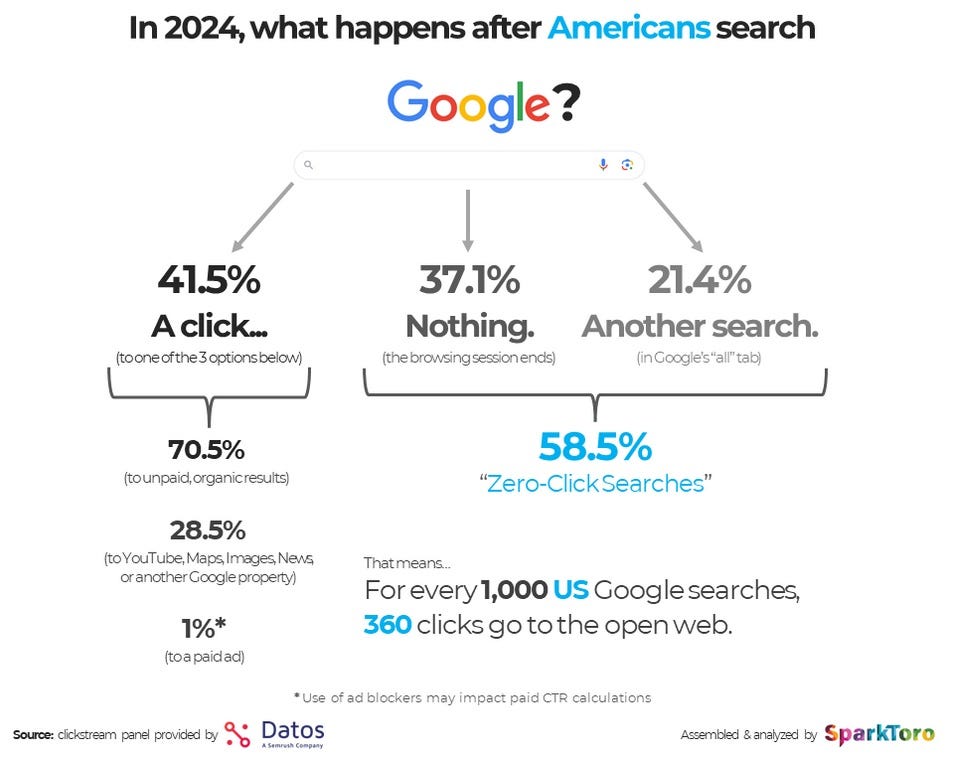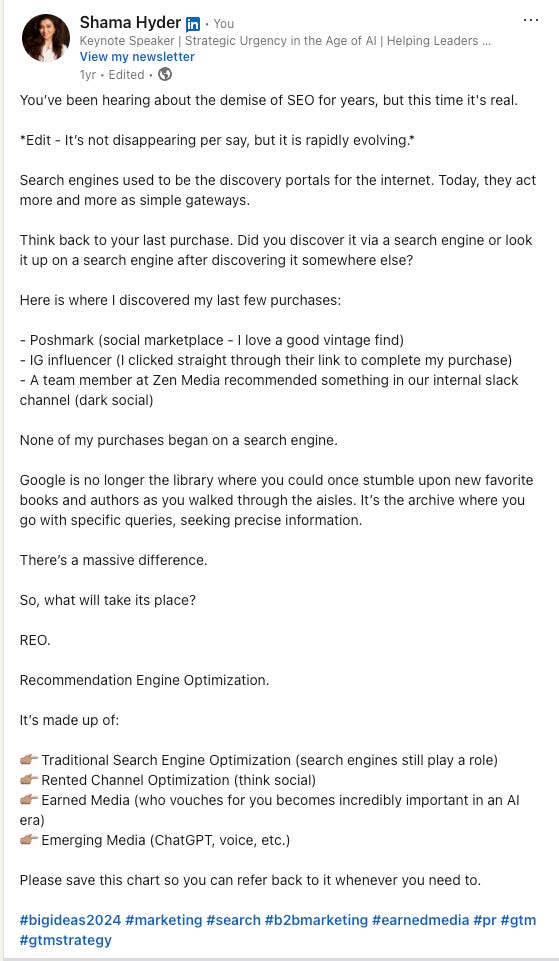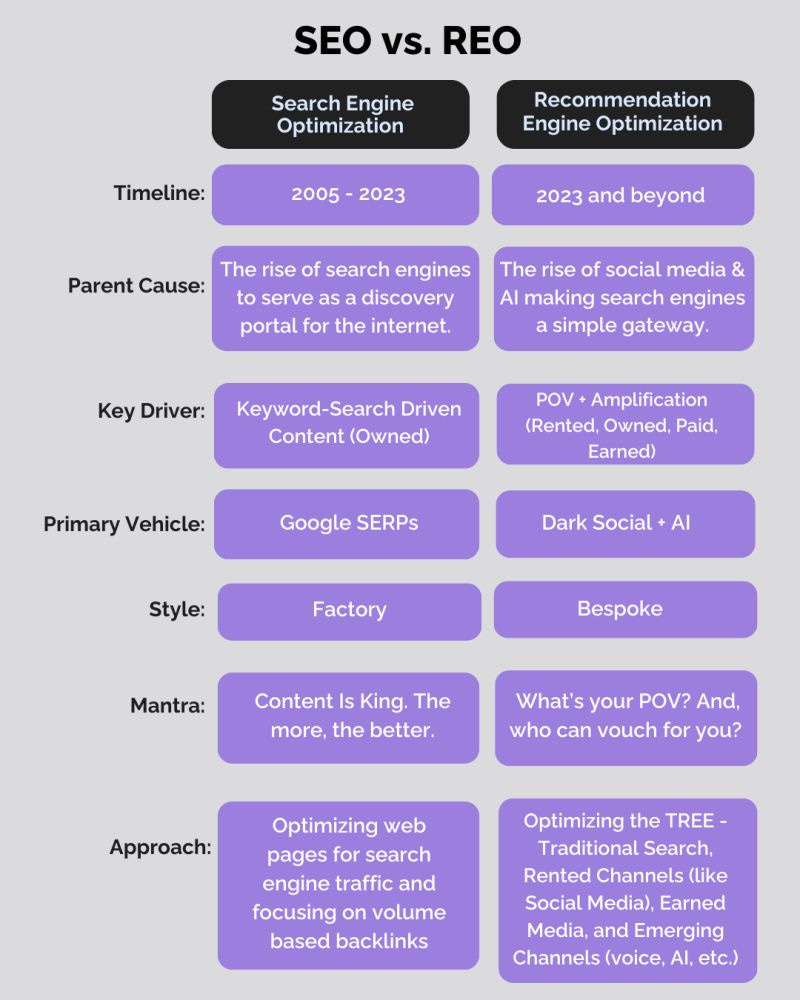We recently ran an experiment that changed everything.
Six hours after publishing a press release through Globe Newswire, we tracked 61 documented mentions across AI engines. ChatGPT cited it 40 times. Meta’s AI mentioned it 17 times. Perplexity and Apple’s systems added another 4.
This isn’t abstract theory. It’s measurable proof that structured press releases are being read, indexed, and cited by AI systems immediately.
The press release has evolved from a distribution tool into what we call a “Generative AI Visibility Engine.” It’s a structured, machine-readable artifact that trains models, seeds authority pages, and determines whether your brand surfaces when someone asks high-value questions.
This isn’t just PR - it’s creating training artifacts for AI systems. Every release now needs schema-embedded FAQs, semantic headlines that read like natural queries, and deep backlinks to your strongest authority pages. The goal isn’t media pickup anymore. It’s feeding AI systems the structured data they need to know you exist.
The Great Search Migration
Something profound happened while we weren’t paying attention. People stopped clicking.
For two decades, the internet operated on a simple premise: Google gives you 10 blue links, you click through, you consume content. The attention economy thrived on this behavior. Publishers built entire business models around capturing those clicks.
Remember when we used to spend hours “surfing the web”? Back when Angelcities and Geocities were the playground, it was a legitimate hobby akin to taking long walks on the beach. We’d follow rabbit holes from site to site, discovering new corners of the internet with genuine curiosity.
But that model just broke.
Today, when someone wants to know “What’s the best CRM for small businesses?” they don’t go to Google anymore. They ask Claude, ChatGPT, Perplexity, Copilot - the AI of their choice. They get an immediate answer with four specific recommendations. Game over. No clicks required.
The numbers tell the story. Companies that dominated SEO for years are seeing organic traffic drops of 20 to 40 percent. Even HubSpot, the undisputed champion of inbound marketing, isn’t immune. The SEO playbook that made them billions is suddenly less effective.
This isn’t a temporary dip. It’s a permanent shift in how humans seek information.
Every previous evolution in information consumption was adaptive. We moved from newspapers to websites, from desktop to mobile, from typing to voice search. Each time, we adapted existing behaviors to new formats.
But this shift is inventive. AI doesn’t just change how we access information—it fundamentally rewrites what seeking information means. Instead of hunting and gathering data points to form conclusions, we now delegate the synthesis process entirely. That’s AI for you.
The Binary Outcome Problem
Here’s what makes this transition so brutal: AI answers create binary outcomes. You’re either in the answer or you’re invisible. There’s no page two.
With Google’s 10 blue links, being ranked #5 still meant something. You got traffic. Not as much as #1, but enough to build a business. There was a gradient of success.
AI systems don’t work that way. When ChatGPT answers a question about CRM software, it might mention four companies. Those four get 100% of the mindshare. The fifth-best option gets exactly zero.
This binary nature means AEO isn’t just the next evolution of SEO. It’s about surviving in a fundamentally different system where ranking incrementally better doesn’t matter. You either make the cut or you don’t exist.
Beyond Clicks: From Influence to Inclusion
Rand Fishkin has argued for years that “site traffic is a vanity metric” and that in a zero-click world, influence matters more than clicks. SparkToro calls this “Search Everywhere Optimization”—the idea that you must show up wherever audiences look for answers, even when there’s no click-through.
That thinking was ahead of its time, and it aligns with what we’ve seen. But in the age of generative AI, influence alone isn’t enough. AI assistants don’t just echo influence, they collapse the field into binary answers. You’re either included, or you’re invisible.
This is where AEO diverges. It’s not simply about being influential across fragmented platforms - it’s about structuring your presence so AI systems cite you, trust you, and include you. If Fishkin’s lens is about influence, AEO raises the stakes: it’s influence converted into inclusion.
The Paradox of Zero Clicks
Webflow discovered this firsthand. Their AI referral traffic converts six times better than traditional Google search traffic. Why? Because users who arrive via AI assistants have already built up intent through conversation. They’ve asked follow-up questions. They’ve refined their needs. By the time they click through, they’re highly qualified prospects.
It’s the difference between someone idly browsing and someone ready to make a decision.
Enter Answer Engine Optimization (AEO)
While everyone else panics about declining SEO effectiveness, smart companies are playing a different game entirely. They’re optimizing for AI answers instead of search rankings.
I saw this shift coming. A year ago,I predicted the evolution from traditional SEO to what we called Recommendation Engine Optimization (REO). The writing was on the wall: Google was becoming less of a discovery library where you stumbled upon new favorite books, and more of a specific-query archive where you went with precise information needs.
The REO framework recognized that optimization had to expand beyond Google SERPs to include the entire TREE: Traditional Search, Rented Channels (social media), Earned Media, and Emerging Channels (voice, AI). The mantra shifted from “Content is King. The more, the better” to “What’s your POV? And, who can vouch for you?”
Now, with concrete data from our press release experiment, we’re seeing REO evolve into its next phase.
Answer Engine Optimization (AEO) isn’t just AI-era SEO. It’s the discipline of winning binary outcomes by feeding AI systems structured training artifacts, ecosystem signals, and consistent volume of credible mentions, where press releases become visibility engines and authority is measured in citations, not clicks.
The tactics flip everything we thought we knew about digital marketing:
Volume beats velocity. In Google SEO, ranking first is everything - the winner takes the traffic. AEO flips that. Ten credible mentions across different sources carry more weight than one top ranking. It’s not about planting a flag in one spot, it’s about showing up consistently wherever the conversation happens.
Signals now matter more than keywords. Forget cramming in exact matches or chasing backlinks for their own sake. What AI looks for is credibility: are other people referencing you, quoting you, pointing back to you as a useful answer? Authority isn’t manufactured with keyword density - it’s built when real voices vouch for you.
Communities carry clout. Take Reddit, for example. Nobody knows the exact formula, but we can already see AI systems leaning on those threads. When people validate your brand in real conversations, it moves the needle. Five thoughtful, authentic comments in the right places often do more than a polished blog ever could. No hacks, no fake profiles - just being genuinely helpful where people ask questions.
Earned media becomes the backbone. With the average buyer journey stretching across 76 touchpoints and more than 200 days, third-party validation isn’t optional - it’s critical. AI engines give more credit to mentions in trade publications, analyst reports, and expert commentary than to branded content. Every credible placement isn’t just good PR - it’s a training signal telling AI systems: this company is worth bringing up.
YouTube offers massive opportunities for “boring” B2B terms. Nobody makes videos about “AI-powered payment processing APIs,” which is exactly why you should. While everyone fights over saturated keywords like “best CRM software,” the high-value, zero-competition long tail is wide open.
Long-tail queries explode. People ask AI assistants questions with 25+ words versus 6 words in Google. Queries like “Which meeting transcription tool integrates with Looker via Zapier to BigQuery?” didn’t exist in traditional search but are perfect for AI. Own these micro-niches.
Help centers become growth engines. All those “Does your product do X?” questions flooding ChatGPT can be answered by well-structured help pages. Move them from subdomains to subdirectories, cross-link aggressively, and cover every possible feature question.
The New Tactics That Actually Work
Our press release experiment revealed something bigger: the tactics for winning in this new world are completely different from traditional SEO.
But there’s another layer to consider. Today’s customer journeys take an average of 211 days and 76 touches before a purchase, according to Dreamdata. In this extended decision-making process, earned media becomes critical. AI systems don’t just pull from your owned content—they heavily weight third-party validation. A mention in a trade publication or industry analysis carries more credibility than your own marketing claims.
This is why AEO success requires thinking beyond your own digital properties:
The New Competitive Landscape
The most exciting part about AEO? The playing field is finally level.
Traditional SEO required years of domain authority building. A startup couldn’t compete with established players regardless of how good their content was. But a brand-new company mentioned in a relevant Reddit thread today can show up in ChatGPT tomorrow.
Early-stage companies are winning at AEO immediately while established brands struggle to adapt their legacy strategies.
Playing the Long Game
We’re still in the early innings of this transformation. There’s no keyword research tool for ChatGPT yet (unlike Google Keyword Planner that we’ve had for years). The competitive landscape remains wide open.
But that window won’t stay open forever. Just like SEO in the early 2000s, the businesses that move quickly and establish authority in AEO will have significant advantages. The difference is that AEO might have even higher barriers to entry once it matures, given the binary nature of AI results.
My prediction: by the end of this year, we’ll see thousands of companies clamoring for AEO. The question is whether you’ll be ahead of that curve or scrambling to catch up.
The Action Plan
If you’re not experimenting with AEO yet, start immediately:
Enable AI crawling. Ensure you’re not blocking OpenAI SearchBot and GPT bots from accessing your content. If you’re not getting indexed, you can’t win.
Track AI traffic. Google Analytics and HubSpot now show AI referrals as separate sources. Measure your baseline today and track improvements over time.
Restructure content. Shift from narrative blog posts to structured question-answer formats. Make it easy for AI to extract clear answers.
Pass the deserve-to-rank test. For any topic you want to rank for, ask ChatGPT that exact question. Do you have content that honestly deserves to rank higher than what’s currently showing up? If not, create it.
Invest in Reddit discussions. Make one real account, be transparent about who you are, and provide genuinely helpful answers in relevant discussions.
Optimize press releases. Include schema-embedded FAQs, semantic headlines, and strategic backlinks. Every release should train AI systems about your brand.
The zero-click world isn’t coming. It’s here. The question isn’t whether this shift will happen, but whether you’ll adapt fast enough to capitalize on it.
The brands that understand this transition isn’t just about technology changes but fundamental shifts in human behavior will be the ones that thrive. Everyone else will be left wondering where their traffic went.
If you want to see how this plays out in practice, start by looking at what your buyers are already asking AI. Zen Media has put together a free resource that gives you the first 100 prompts shaping decisions in your industry. It’s not theory—it’s a way to see the exact questions AI is being trained on and where your brand could show up. You can grab your list here: zenmedia.com/1000prompts




